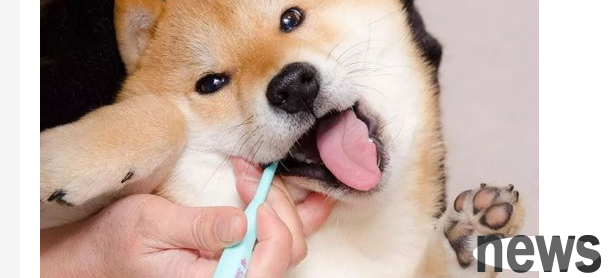Toothache is not a disease, it will be a life-threatening pain! Who is not afraid of oral problems? The same goes for dogs! If there is a problem with the oral cavity, it will not only cause the dog to suffer from toothache, but it will also affect the dog's nutritional absorption and affect physical health. After all, "If the teeth are good, the appetite is good."

Scientists have found that most dogs currently have the potential to suffer from oral diseases: 80% of dogs over three years old are accompanied by oral problems such as tartar accumulation - plaque, tartar, etc., and will further develop into periodontal disease - oral diseases such as gingivitis, periodontitis, etc.
So how can you help your dogs with daily oral care and prevent oral diseases? Let’s take a look below!
The dog's mouth is a little ulcerated
How to judge the dog's oral health?
1. Smelling breath
Smelling breathing is often the first symptom of oral diseases. Owners need to smell the "breath" of dogs. If there is unbearable bad breath, it means that there is already a problem in their mouths. Owners need to insist on taking good oral care for their dogs
2. Observe whether they drool
If the dog keeps drooling, they may suffer from oral inflammation or salivary gland problems. If this happens, please open the dog's mouth. If you find red gums, it will prove that the dog's mouth is not very healthy.
3. Observe teeth and gums
If you find that your dog's teeth are yellow and there are tartars at the junction of teeth and gums, be alert and brush your teeth every day. If the condition is serious, consider cleaning the teeth. Otherwise, these phenomena are likely to cause periodontal disease.
4. Unwilling to eat
Oral pain will naturally affect chewing, resulting in a prolonged eating time or even no food. If the dog's meal time is relatively stable, but it suddenly extends significantly on one day, it is best to check whether there are foreign objects or wounds in the mouth.
Oral care methods A comprehensive inventory of
In daily life, what are the methods that can prevent and treat the above symptoms of dogs? The following summarizes four tips for daily oral care for dogs:

1. Brushing teeth
Whether for humans or dogs, brushing teeth every day is the most convenient and effective way to care for oral health.
When you first start cleaning your dog's teeth, you can try wrapping gauze on your fingers, dipping them in pure water, and then putting them in your dog's mouth to wipe your teeth.
The brushing time does not exceed 2 minutes at the beginning. Once the dog is unwilling, stop and ends with a happy state every time. After dogs such as
can use a finger-style special toothbrush and dog toothpaste to brush their teeth. Be careful not to use human toothpaste. The general method is to make circular movements on the surface of the teeth, and clean them very hard on several sides of the teeth, including the gums, gingival sulcus and crown.
Brushing teeth can remove about 87% of plaque, so it is best to brush your teeth after meals every day~
2. Scrubbing teeth
If the dog has serious periodontal problems or gum problems, you can consider going to a professional stomatologist to clean the dog's teeth and deeply clean the teeth. If you have had teeth cleaning before, you can clean your dog every two years to form a continuous dental care system.
3. Regular professional inspections
Although teeth cleaning is not necessary so frequently, regular inspections are definitely indispensable. Pet owners need to take their dogs for professional oral examinations regularly and provide oral protection for their dogs according to the professional advice of pet doctors.
4. In addition to daily cleaning, owners can also use a "tooth protection artifact" to help dogs care for their oral health, that is - "tooth cleaning rod"! It can protect dog's teeth and can also be used as a reward snack.
